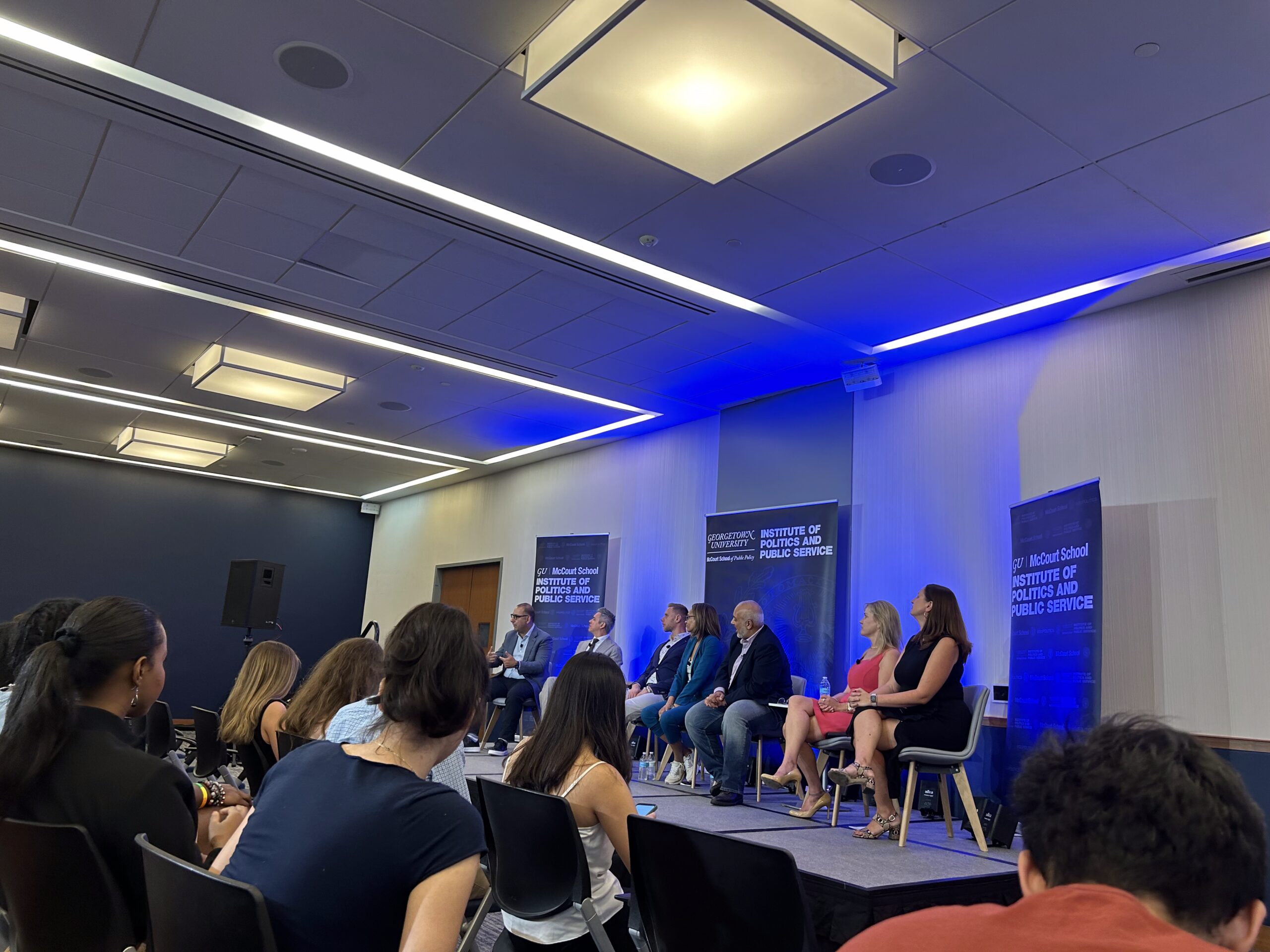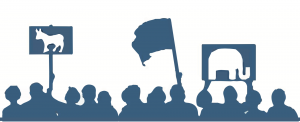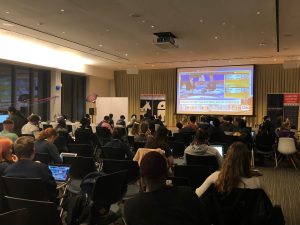Darius Wagner (CAS ’27), frequently watched CNN Senior Political Analyst Nia-Malika Henderson on TV alongside his family. He was able to pose a question directly to her and the five other fellows at the Georgetown Institute of Politics and Public Service (GU Politics) Fellows Open House in the Healey Family Student Center Social Room on Sept. 7.
“How can we better navigate truth and partisanship to protect the state of our democracy?”
Wagner’s question, motivated by the Jan. 6 insurrection and its aftermath, spoke to the national polarization that politicians, journalists, and government officials have reckoned with in recent years.
“Biden won the election. That isn’t a partisan statement. It’s just a fact. But it is an ongoing struggle for reporters, both in print and on air and for practitioners, pollsters and partisans on either side,” Henderson said. “This is kind of a new thing in American politics where we have one party that’s led by a conspiracy theorist. And the press, I think, isn’t always up to the job of covering that and the threat it poses to democracy.”
Each semester, Georgetown students have the opportunity to interact with industry leaders, like Henderson, who have first-hand experience handling the nation’s toughest questions. Through the GU Politics program, the fellows host weekly discussion groups, office hours, and other events, covering issues including polarization, data, and elections.
In addition to Henderson, this semester’s fellows include former Deputy White House Cabinet Secretary to President Joe Biden Cristóbal Alex, Republican pollster and President of Axis Research Inc. Brenda Gianiny, Senior Vice President with The Daschle Group and Former U.S. Senate Chief of Staff Joe Hack (CAS ’09), former Spokesperson for the National Security Council for the Biden Administration Emily Horne and former Chief Content, Communications and Marketing Officer for the Clinton Foundation Craig Minassian.
The fellows sat down with the Voice to discuss why they’re looking forward to connecting with students, the motivations behind their career choices, and what makes them hopeful for the U.S. government’s future. They are excited to share their insights and experiences, as well as learn from the students themselves, the fellows said.
“As someone who’s a product of very staid bureaucracies, I feel like I had to spend a lot of my twenties and thirties kind of aging myself up in order to fit into these very small seat conservative workspaces,” Horne said. “I feel like now is actually a great time to go back and revisit some of that youthful energy and perspective that I think so many of our government institutions would really benefit from if they were able to harness it more effectively.”
Though all of their careers have led them to influential positions, the fellows’ attributed their success to a variety of factors.
Horne said she thinks she and the other fellows benefitted from “a tremendous amount of luck”, which she defined as “preparation plus opportunity.” Hack, who was among the youngest in the position of Senate Chief of Staff, emphasized the importance of learning quickly, while Gianiny credits a tough professor that approached her with an internship opportunity. Minassian and Henderson both pointed to the first campaigns they worked on.
“I hadn’t done a campaign before, and it just opened my eyes to a whole range of possibilities and understanding about politics,” Minassian said, referring to his work on former President Bill Clinton’s 1996 presidential campaign. “Seeing politics up close, but also working with the candidate and the senior leaders in the campaign, and it just was an incredible experience. It made me think, ‘I can do this’ because before then it seemed pretty inaccessible.”
Alex stressed the importance of remembering his initial motivations for a career in public service. He grew up as the child of a migrant farmworker, and the brother of a person with autism.
“I was honored when I was sitting in the White House to have on my desk my grandfather’s Bracero papers, which were the papers that he was given to be able to come to the United States and pick cotton,” he said at the open house. “And I take that in any job I’ve ever had and have it right on my desk. So you never forget, you’re always grounded.”
Working in Washington, although rewarding, is not without its challenges, the group added. The fellows emphasized taking breaks when necessary and maintaining a personal life outside of work.
“When you have the privilege of serving your country, of walking the halls of the White House or the Pentagon or Congress every day, you should be in awe of that experience,” Horne said. “I know for me there have been times in my career where I have lost sight of that awe because the grind of the day to day tasks, the incline of the uphill battle that we’re fighting, it just feels a little too great. That’s when it’s time to take a break.”
Minassian discussed the value of having many interests and developing skills that transfer across industries. Henderson and Horne stressed maintaining personal relationships with a supportive partner or community. Gianiny and Hack lean on their hobbies: astronomy and arranging flowers, respectively.
However, even when they feel challenged, the fellows remain hopeful for the future. When asked about what maintains their faith in the U.S. government’s ability to serve its people, the fellows’ answers varied, but each expressed optimism.
Henderson is reassured by the progress on LGBTQ+ issues over the last decade. Horne is inspired by the country’s response to the COVID-19 pandemic, including Operation Warp Speed. Hack and Minassian cite the people that they’ve encountered working in government that are committed to progress for the country.
Alex places his hope in the idealism of the next generation, observing that social progress shows up in culture before policy.
“I think culture eats politics for breakfast every day,” Alex said. “It takes government and Washington a while to catch up to it, but that’s what gives me hope seeing [the students at the open house] in that room yesterday, and that next generation of leadership, and the idealism, and the hard work, and that, at the end of the day, is what’s gonna keep our democracy going.”







